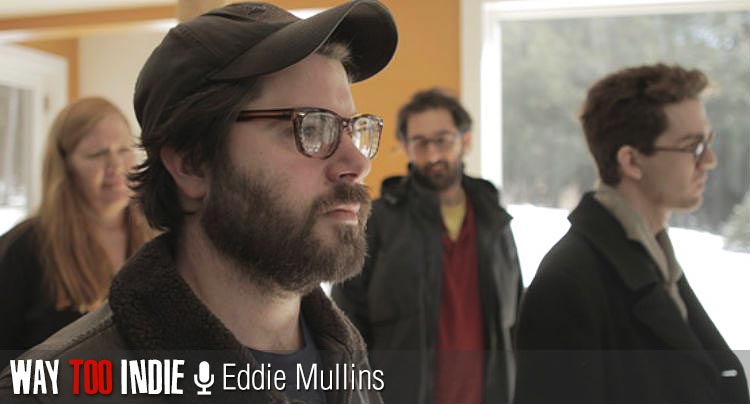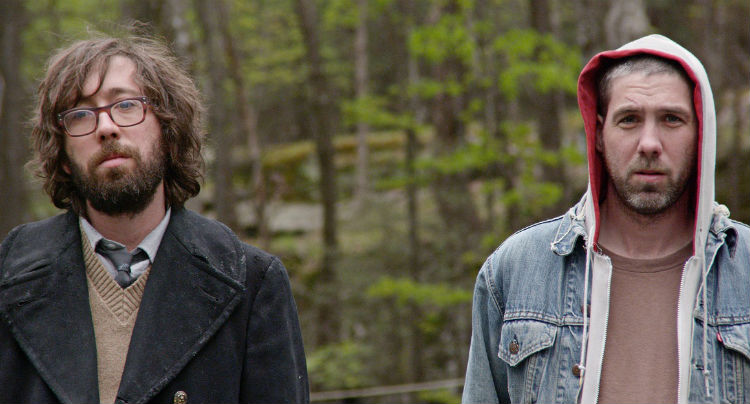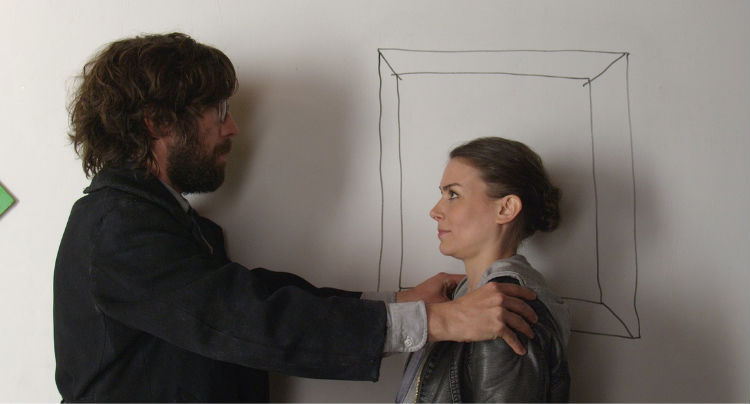Eddie Mullins Talks Peak Oil, Cameras On Sticks, “Doomsdays”

Dirty Fred (Justin Rice) and Bruho (Leo Fitzpatrick), believe that peak oil–the theory that we will soon deplete the earth of petroleum, causing the demise of our modern lifestyles–will bring upon mass hysteria and a societal breakdown. In preparation of the impending apocalypse, they’ve chosen to stay ahead of the curve, adopting a vagabond lifestyle, trekking through the Catskills, scavenging through rich people’s vacation homes for supplies (and booze, pills, and other fun stuff). When they accept a smart-ass teenager (Brian Charles Johnson) and a fiery young woman (Laura Campbell) into their group, however, they’re forced to reevaluate their pre-apocalyptic lifestyle.
Doomsdays is a meticulously crafted, devilishly funny road movie on foot (though cars do play a role as the smash-able victims of Bruho’s rage). First time director Eddie Mullins was a film critic for a decade prior to becoming a filmmaker, and as a result has an encyclopedic pool of filmic reference from which to pull from. During SF Indiefest, we spoke to him about whether he’d have the same reaction to the apocalypse as his characters, how film criticism can numb enthusiasm, his directorial influences, the art of blocking as opposed to editing, and more.
If the world did break down as a result of peak oil, would you behave the way your characters do?
Eddie: Most of the crew were young men, guys in their 20s. The same comment was made over and over again. “I could see myself doing this.” It could be peak oil, or global warming. There are so many possibilities.
Singularity may be a different movie entirely.
Eddie: I didn’t actually name check Ray Kurzweil, but I wanted the Reina character to at least pay lip service to an alternative possibility. I guess because I’m an old man, I still buy and read the hard copy of Rolling Stone every month. I know it’s like saying, “I read Playboy for the articles,” but I actually read Rolling Stone for the articles. Matt Taibbi is the man. There was a piece about Her, and they asked a couple notables in the tech world, “When will we be at a point where an operating system that is this close to being human?” Ray Kurzweil said, “Oh. 2039.” I was like, that’s really specific, man! You seem really confident! I was impressed an appalled at the same time.
You got some beautiful shots in the film. Since you shot in the town you live in, did you already have a lot of these shots in mind before production began?
Eddie: Absolutely. Most of the homes are friends’ places. The art gallery is my house. My girlfriend and I run an art gallery out of that room. It was great because I knew well in advance where I was going to be shooting, so I could tailor my shots as I was blocking them out on the page months and months before I started hiring a crew. I shot the film in a fairly idiosyncratic way. There are maybe four match cuts in the entire film. The idea was to have each scene rendered in one shot. You have to figure out how to sustain visual interest through blocking. We have a lot of deep focus shots where different theaters of activity encourages a different kind of spectatorship than what you normally get at the movies. This is certainly not something I dreamt up on my own; I’m standing on the shoulders of giants.
At times the shots remind me of Tati.
Eddie: Tati is certainly an influence. I’m in the minority. I think Traffic is his masterpiece. I’m not a Playtime guy. Shohei Imamura and Mizoguchi Kenji [are influences]. William Wyler, particularly Little Foxes. None of those filmmakers are quite as locked off as us. I think we have one tracking shot in the picture. Every single shot is on sticks.
Did you go to film school?
Eddie: Yes I did.
The reason I ask is, you don’t really see a lot of people making films the way you made Doomsdays anymore. There isn’t much editing involved in your film.
Eddie: The way Hollywood films are made…it’s like capitalism, or air. Most of us are just born into it, and we take it for granted. You go to film school and they say, “This is how you film a shot. You do the wide, the medium, the close-ups, the over-the-shoulders, and then you figure it out in the editing room.” No one ever presented to me in film school alternatives to this approach. My real education as a filmmaker came during my ten years as a critic. It’s an enormous privilege to be able to think and write about movies for a decade. Had I not done that, I’m not sure whether I would have become a filmmaker. And if I had, I probably would have been a rather shitty one.

How did those ten years of being a critic shape your taste in film?
Eddie: Being a critic can numb your enthusiasm for movies. You’re obliged to see so many, so often, and the majority of them are bad. I was fortunate to write for a fairly hip magazine. My longest tenure was at BlackBook, which is an awesome culture magazine. I’d be able to watch what I wanted sometimes, but I’d still have to muddle through Paul Blart: Mall Cop or whatever. It can be so demoralizing. It’s been a pleasure to stop being a film critic and no longer have to swim all the time and keep up with everything. Now people have to keep up with me. I much prefer this. (laughs) But I have seen Nymphomaniac. I ask myself this all the time: Who’s the American Lars Von Trier? Or Wong Kar Wai? Or Johnnie To? I don’t think we have them, certainly not in Hollywood. Independent filmmaking is becoming so vanilla, so jejune. You don’t really see a lot of edgy pictures coming out of Sundance or SXSW. Beasts of the Southern Wild is certainly an independent film, and it’s a lovely picture, but it slides very easily into the art house market that, in this day and age, is dominated by what we call in this industry “blue hairs”. Older women are the biggest consumers of independent cinema. This wasn’t true in 1992, when we had this rash of people coming through every day, like Richard Linklater, Robert Rodriguez, Quentin Tarantino, and even Kevin Smith, who I have no love for, but Clerks was a breath of fresh air. These were edgy filmmakers. There doesn’t seem to be an appetite for this anymore.
What shot are you most proud of in Doomsdays?
Eddie: Probably the shot where Leo goes to the window and sees Laura talking to her boyfriend outside. They start having a little fight, then Leo exits the upstairs window and comes down into the frame he was watching before. As he does that, Justin comes in and takes his place to watch the fight play out. There are, like, 12 different moving parts to that shot. We actually had the cops come during that shot. They had a number of calls that said there was a fight going on. The crew was scared, andI felt like a real champ, because the cop got out of his car and I said, “Oh, I know that guy. His name’s Mark.” The shot in the bar was incredibly difficult. I talk about different theaters of activity, and there’s the bit where Leo and the drunk go outside and fight, and you only see them as they go back and forth in front of this glass window.
That shot is so much fun.
Eddie: I like for the violence to be hyperbolic, and I think I get that from Godard. People mention Weekend in talking about the film, and they’re dead-on. That’s a huge influence on me, and I was thinking about it while I was writing the picture. I think the difference is that my film is much more self-consciously comic. It’s a black comedy, basically. The staging that I’m doing in this picture is a very specific formal agenda that I have going on in this picture. Very few people thought it was going to work, myself included. I thought, is this just going to be incredibly static? The camera’s on sticks, there’s no cutting, there’s zero coverage. I’ve often speculated that if the producer were anyone other than myself, this idea might not have flown. It’s so unforgiving. There’s no going back and fixing anyone’s timing. If your best take has a boom mic shadow in it…well, that’s the best take.
It’s approaching theater.
Eddie: Yeah, it is. It’s a mixed blessing for the actors because they have to sustain. If one person cocks it up and everybody else gets it right, that cock-up might stay in there. Alternately, it’s great for them because they don’t have to shoot a scene 47 times. I think the most amount of takes we had to do on a certain scene was 16. Once we got it right, we moved on. Justin Rice is my neighbor, and all of the actors stayed in his house. I think I got along famously with all of my actors. With a few exceptions, we always went straight to the bar after shooting.

How important was that rapport?
Eddie: It was indispensable. Everyone asks how I got this wonderfully organic relationship between all of these people. It’s easy! They all lived cheek by jowl for a month! Everyone liked one another, and they’re all still my friends. I’m quite fortunate.
Justin’s dialog is so peculiarly poetic. His lines are great.
Eddie: Justin came onboard before I’d even finished the script. He hadn’t done anything in 3-4 years, but he has 9 movies under his belt, all in lead roles. He’d always been type-cast as the sensitive, milquetoast type. I don’t think he’s ever had a role before Doomsdays where he doesn’t play guitar. I didn’t know if either of the characters were right for him, but then a light bulb went off in my head. Bing! I was like, “Oh my god…do you want to play Dirty Fred? It would completely upend your image. I want you to grow your hair long, grow a beard, wear glasses. And no guitar!” He even got method. I’d written in the script that Dirty Fred had a chipped tooth. One of Justin’s teeth had a crown from an accident that happened, so we got a dentist friend to shave it down. But with the way I shot it, you can’t see it at all! (laughs) Justin’s a Harvard graduate, so I knew he wouldn’t have a problem with the dialog. He’s a very Withnail-y character. Knowing what his energy is like, I knew he was going to do it deadpan. I think if I had read other people for the part, I’d have had a lot of people doing really flamboyant stuff. I love how you have Leo Fitzpatrick as Bruho with all of this angry energy, and then Justin who quietly goes about his business with all these pearls in his mouth.
I love the jokes in the movie. They match the characters perfectly. Dirty Fred’s is so poetic, and Jaiden’s is a fart joke. And Jaiden is so juvenile he can’t even recite Dirty Fred’s!
Eddie: (laughs) No, it’s too subtle for him. I like the idea of, as a piece of entertainment, to stipple throughout people telling jokes. The one that Dirty Fred tells is actually something my grandfather used to tell. When I showed it at the Virginia film festival, my two aunts were there. That joke always gets laughs, but that night you could hear peals of screaming laughter in the back! (laughs)
And Bruho’s joke is simply, “Fuck your mother”.
Eddie: (laughs) I think that’s in keeping with the character. Leo was really helpful. He had more experience than any of the actors, and he was encouraging to me, as a first time director. It was a really good time. It was very intimate–we shot the picture in 18 days. And lo and behold, people have actually given a shit.
